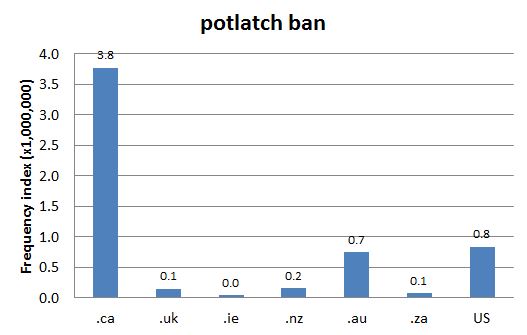DCHP-2
potlatch ban DCHP-2 (October 2016)
n. — Law, Administration, Aboriginal
the banning of the potlatch ceremony by the federal government from 1884 to 1951.
Type: 6. Memorial — In 1884, the federal government partially banned the potlatch ceremony, reportedly because of government disapproval of Aboriginal treatment of property. By the end of the period (see the 1936 quotation), the potlatch was completely banned. As potlatches are integral to First Nations culture, especially for Nations from the West Coast, the potlatch ban had a culturally damaging effect. The ban was lifted in 1951 (see Canadian Encyclopedia reference). The term is most prevalent in Canada (see Chart 1). The term as such is a rather recent phenomenon, as shown by the date of the earliest quotation (1985).See also: potlatch ((n.)) (meaning 2a) assimilation
References:
- Canadian Encyclopedia "Potlatch" Accessed 22 Jul. 2016
Images:
Chart 1: Internet Domain Search, 21 Jan. 2014
